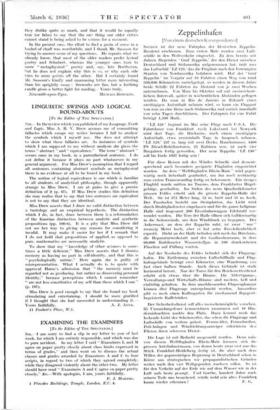LINGUISTIC SWINGS AND LOGICAL ROUND-ABOUTS
[To the Editor of TIIE SPECTATOR.] SIR,—In the review which you published of my Language, Truth and Logic, Miss A. B. V. Drew accuses me of committing fallacies which escape my notice because I fail to analyse the symbols which I myself use. She does not attempt to show what these fallacies are. As instances of symbols which I am supposed to use without analysis she gives the terms " abstract " and equivalence." The term " abstract " occurs once in my book, in a parenthetical sentence. I do not define it because it plays no part whatsoever in my general argument. For Miss Drew's assumption that I regard all sentences containing abstract symbols as metaphysical there is no evidence at all to be found in my book.
The notion of logical equivalence is one which is familiar to all students of analytical philosophy, though apparently strange to Miss Drew. I run at pains to give a precise definition of it (p. 67). If Miss Drew studies this definition she may realise that to say that two sentences are equivalent is not to say that they are identical.
Miss Drew asserts that I draw no valid distinction between a tautology and an empirical hypothesis. The distinction which I do, in fact, draw between them is a reformulation of the Kantian distinction between analytic and synthetic propositions (pp. 100-6). It is a pity that Miss Drew did not see her way to giving any reasons for considering it invalid. It may make it easier for her if I remark that I do not hold that propositions of applied, as opposed to pure, mathematics are necessarily analytic.
To show that my " knowledge of other sc:ences is some- times a little deficient," Miss Drew asserts that. I dismiss memory as having no part in self-identity, and that this is " psychologically untrue." Here again she is guilty of misrepresentation. What I actually do is to quote with approval Hume's admission that " the memory must be regarded not as producing, but rather as discovering personal identity," because perceptions which I cannot remember -" are not less constitutive of my self than those which I can " (p. 197).
Miss Drew is good enough to say that she found my book stimulating and entertaining. I should be more gratified if I thought that she had succeeded in understanding it.--
















































 Previous page
Previous page